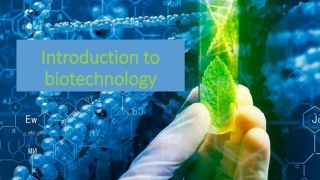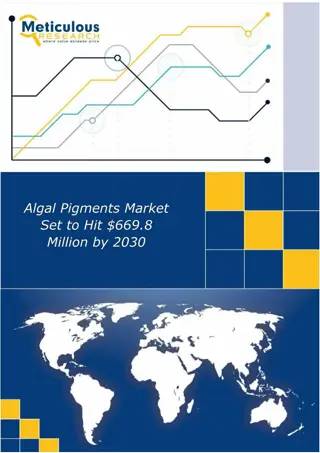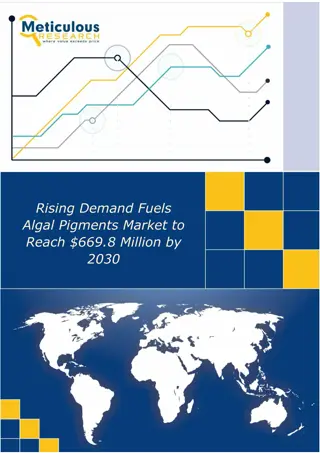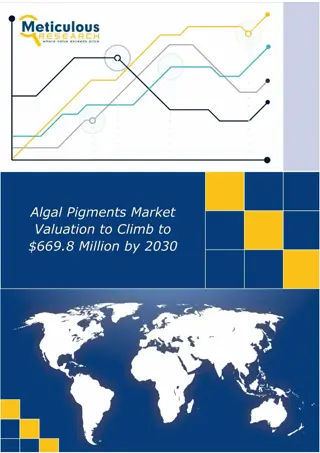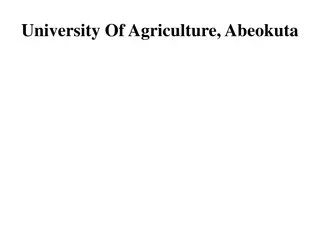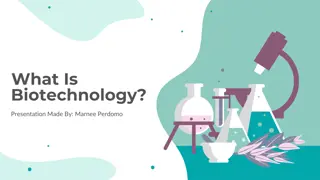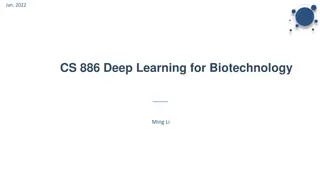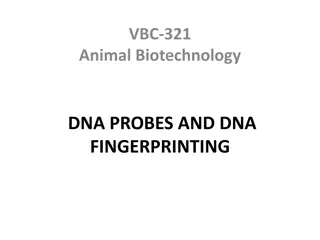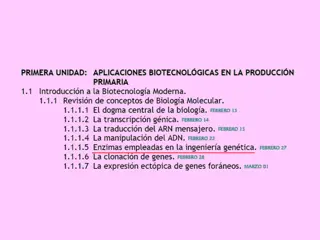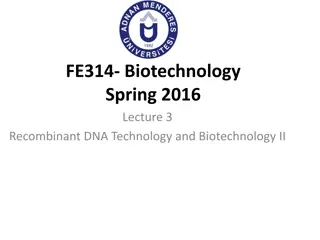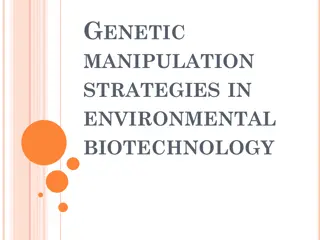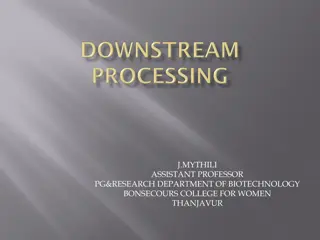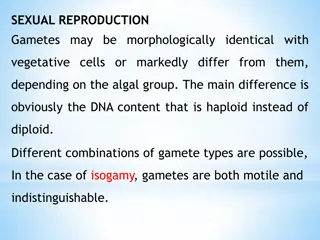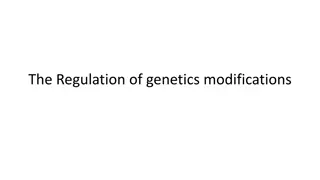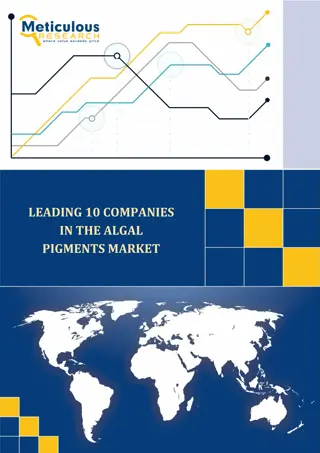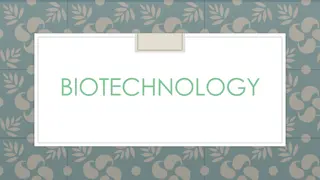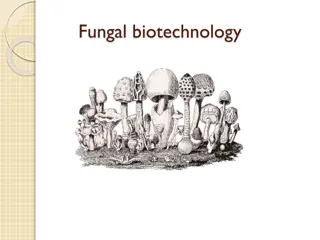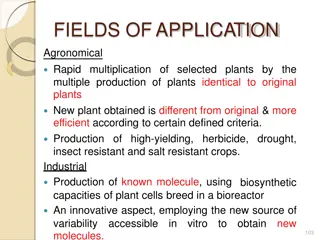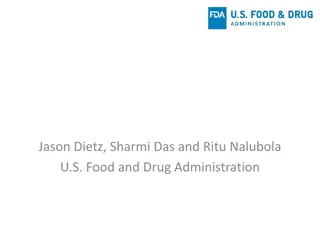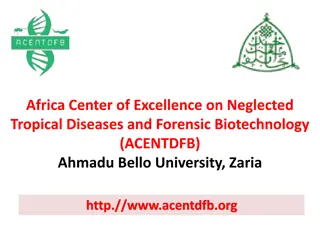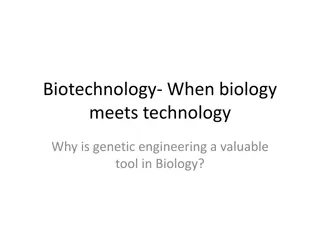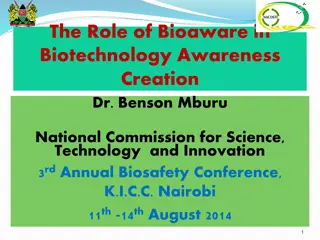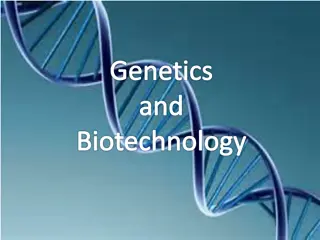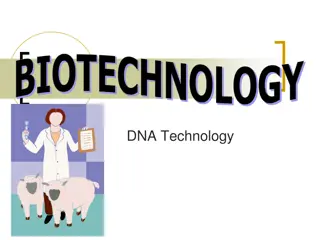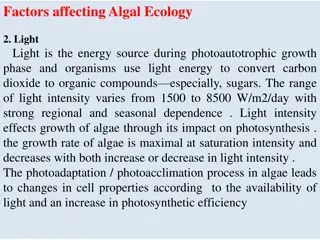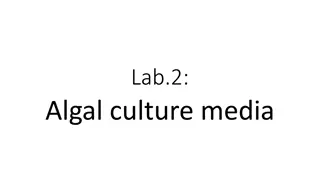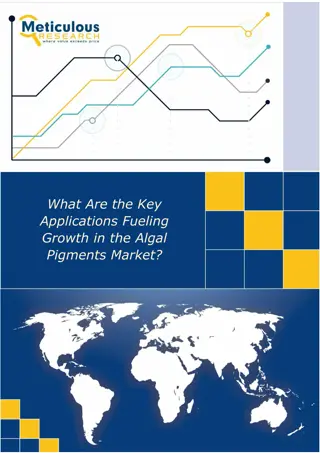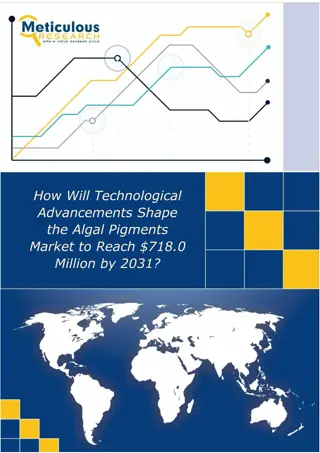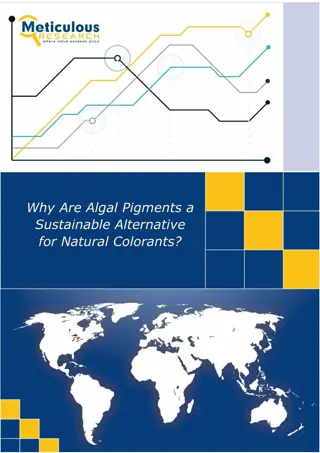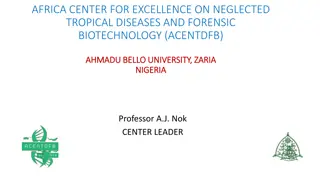Introduction to biotechnology
Learn about the integration of natural sciences and engineering in biotechnology, the applications and innovations in various fields, and the history of this technology.
8 views • 21 slides
Introduction to Biotechnology in Pharmaceutical Sciences: A Comprehensive Overview by Swarnakshi Upadhyay
Biotechnology in pharmaceutical sciences encompasses the application of scientific and engineering principles to utilize biological agents for various services. It includes molecular biology for production of pharmaceuticals like antibiotics, proteins, and enzymes, as well as large-scale production
0 views • 9 slides
Comprehensive Overview of ABE Lab Manual and Foundations of Biotech Package
The ABE Lab Manual, authored by Doreen Osgood, MS, PhD, is a comprehensive resource for biotechnology education, including sequences like Genetic Engineering and Colony PCR. The manual includes teacher and student guides, along with related resources like PowerPoint presentations and lists of labora
1 views • 5 slides
Biotechnology Education Programs in High Schools
The Advanced Technological Education (ATE) National Science Foundation Biotechnology Program provides funding for various biotech education initiatives in high schools. These programs aim to create STEM awareness, offer hands-on experiences, and provide career guidance to students. Grant-funded prog
2 views • 5 slides
Projections Show Algal Pigments Market Set to Surpass $669.8 Million by 2030
Dive into the dynamic realm of the algal pigments market with a comprehensive analysis of types, forms, sources, and applications. This forecast encapsulates a wide spectrum of algal pigments including Beta-Carotene, Astaxanthin, Phycocyanin, Phycoerythrin, and Chlorophyll, predominantly in powder f
0 views • 4 slides
Algal Pigments Market Set to Hit $669.8 Million by 2030
Dive into the dynamic realm of the algal pigments market with a comprehensive analysis of types, forms, sources, and applications. This forecast encapsulates a wide spectrum of algal pigments including Beta-Carotene, Astaxanthin, Phycocyanin, Phycoerythrin, and Chlorophyll, predominantly in powder f
0 views • 4 slides
Rising Demand Fuels Algal Pigments Market to Reach $669.8 Million by 2030
According to the most recent report by Meticulous Research\u00ae, the algal pigments market is projected to achieve $669.8 million by 2030.\n
0 views • 4 slides
Algal Pigments Market Valuation to Climb to $669.8 Million by 2030
As reported in the latest publication by Meticulous Research\u00ae, the algal pigments market is projected to reach $669.8 million by 2030, with a compound annual growth rate (CAGR) of 7.2% from 2023 to 2030.\n
0 views • 4 slides
Overview of Industrial Biochemistry and Biotechnology
This course outline covers key topics in industrial biochemistry, microbiology, and biotechnology, focusing on the use of microorganisms and molecules to achieve specific goals in production processes. It delves into microbial physiology, genetics, metabolic pathways, enzymes, microbial growth, ferm
0 views • 10 slides
Exploring Biotechnology in Agriculture at University of Abeokuta
Delve into the world of Biotechnology at the University of Agriculture in Abeokuta, where students are equipped with interdisciplinary knowledge to apply microorganisms for practical applications in society. The course, led by Prof. I. Akpan and Dr. F. Oluwafemi, aims to broaden students' understand
0 views • 61 slides
Understanding Biotechnology: A Comprehensive Overview
Biotechnology is the application of technology based on biology, utilizing living organisms and molecular biology to create healthcare products. It involves studying the functionality of living organisms by combining biology, physics, chemistry, mathematics, and technology. Careers in biotechnology
0 views • 8 slides
Ongoing USDA Programs and Biotechnology Research Overview
This overview delves into ongoing USDA programs such as the Biotechnology Risk Assessment Grants (BRAG) Program, which supports biotechnology research. The program covers risk assessment, management, pollen flow research, gene transfer control methods, and more. Additionally, voluntary market facili
0 views • 16 slides
Deep Learning Applications in Biotechnology: Word2Vec and Beyond
Explore the intersection of deep learning and biotechnology, focusing on Word2Vec and its applications in protein structure prediction. Understand the transformation from discrete to continuous space, the challenges of traditional word representation methods, and the implications for computational l
0 views • 28 slides
Understanding DNA Probes and Fingerprinting in Animal Biotechnology
DNA probes play a crucial role in DNA fingerprinting, aiding in the detection of specific genetic sequences. Different types of probes, such as oligonucleotide, DNA, and cRNA probes, are utilized for various applications. Labeling methods, advantages, and disadvantages of hot and cold probes are dis
0 views • 22 slides
Overview of Key Enzymes in Modern Biotechnology
This content provides insights into important enzymes used in modern biotechnology, focusing on DNA ligases and polymerases. It delves into the structures, mechanisms, and characteristics of these enzymes, such as Taq polymerase and bacteriophage T4 DNA ligase. Through detailed descriptions and imag
0 views • 15 slides
Applications of Recombinant DNA Technology in Biotechnology
Explore the various applications of recombinant DNA technology in biotechnology, including insulin production for diabetes, enzyme production in food biotechnology, and the development of Golden Rice. Understand the process of insulin production using recombinant DNA technology and the significance
0 views • 32 slides
Genetic Manipulation in Environmental Biotechnology
Genetic manipulation strategies in environmental biotechnology involve techniques like gene splicing and molecular cloning to modify genes directly. These methods have various applications such as isolating genes, producing specific molecules, improving biochemical production, creating organisms wit
0 views • 20 slides
Insights into Biotechnology: Concepts and Applications
Biotechnology involves the application of scientific and engineering principles to utilize biological agents for producing goods and services. The field encompasses processes like upstream processing, fermentation, and downstream processing to create valuable compounds. Initially, efforts focused on
0 views • 22 slides
Exploring Downstream Processing in Biotechnology for Product Recovery and Purification
Downstream processing in biotechnology involves the recovery and purification of biosynthetic products like pharmaceuticals from natural sources, using techniques such as filtration, centrifugation, and flocculation. This process is crucial in manufacturing antibiotics, hormones, antibodies, vaccine
1 views • 25 slides
Understanding Algal Sexual Reproduction and Life Cycles
Algal sexual reproduction involves various types of gametes, from isogamy to oogamy, with distinct sizes and motility. Algae exhibit different life cycles like haplontic, diplontic, and diplohaplontic, each characterized by specific mechanisms of meiosis and stages of haploid and diploid phases.
0 views • 24 slides
The Regulation of Genetics Modifications in Biotechnology
Biotechnology plays a significant role in engineering plants and regulating food crops through genetic modifications. The use of modern biotechnology, such as genetically modified organisms (GMOs), has grown exponentially worldwide. Advantages include increased agricultural productivity and improved
0 views • 11 slides
Algal Pigments Market
The Algal Pigments Market is on track for steady growth, anticipated to achieve a 4% CAGR between 2019 and 2025. With this growth rate, the market is projected to reach $452.4 million by 2025, highlighting the increasing adoption of algal pigments ac
1 views • 4 slides
Biotechnology Technician Certificate Program Overview
The Biotechnology Technician certificate program offers an insight into the science and technical skills required for a career in biotechnology. Graduates gain essential laboratory skills, scientific knowledge, and critical thinking abilities to work effectively in the industry. The curriculum cover
1 views • 9 slides
Advances in Biotechnology: Transforming Health, Environment, and Science
The 21st century is witnessing remarkable progress in biotechnology, with significant discoveries shaping the fields of health, environment, and science. From the introduction of penicillin antibiotics to the creation of transgenic organisms, biotechnology continues to pave the way for innovative so
0 views • 17 slides
Understanding Biotechnology: Techniques, Definitions, and Applications
Biotechnology involves the use of living organisms or their components to develop products in various fields like Industry, Agriculture, Medicine, and Food Processing. It integrates biochemistry, microbiology, and engineering sciences for industrial applications, including genetic engineering to cre
2 views • 27 slides
Exploring the World of Fungal Biotechnology
Fungal biotechnology involves utilizing living organisms like fungi for industrial applications, leading to the production of various valuable products such as enzymes, vitamins, and secondary metabolites. This field not only benefits industries by offering energy-efficient processes but also contri
0 views • 15 slides
Plant Tissue Culture Applications in Agriculture and Biotechnology
Plant tissue culture technology is a versatile tool used in agronomy and biotechnology for rapid multiplication of selected plants, production of high-yielding, herbicide, drought, insect, and salt-resistant crops, as well as the generation of phytopharmaceuticals, secondary metabolites, and novel c
0 views • 17 slides
Education Initiative on Agricultural Biotechnology by U.S. FDA
U.S. FDA developed an initiative to educate the public on agricultural biotechnology, addressing misinformation and promoting science-based information. The initiative involves research, stakeholder consultations, and the release of materials in multiple languages to increase consumer understanding
0 views • 12 slides
Advancing Research and Innovation in Neglected Tropical Diseases and Forensic Biotechnology at Ahmadu Bello University, Zaria
The Africa Center of Excellence on Neglected Tropical Diseases and Forensic Biotechnology (ACENTDFB) at Ahmadu Bello University in Zaria is focused on upgrading its facilities, expanding research units, and establishing advanced laboratories to address global health challenges. Strategic objectives
0 views • 11 slides
Exploring Genetic Engineering and DNA Fingerprinting in Biotechnology
Discover the intersection of biology and technology through genetic engineering and biotechnology, which have revolutionized fields such as forensics, medicine, and agriculture. Learn about DNA manipulation, DNA fingerprinting processes, and how they are applied in forensic investigations and patern
0 views • 27 slides
Role of Bioaware in Biotechnology Awareness Creation
Bioaware, the national biotechnology awareness strategy hosted at NACOSTI, aims to provide a participatory mechanism for creating awareness about the role of biotechnology in Kenya's development agenda. It seeks to impart knowledge of biotechnology and its products to human health and the environmen
0 views • 16 slides
Exploring Genetics and Biotechnology Concepts
This educational content delves into various genetics and biotechnology concepts, including genotypes, DNA segments, heredity, flower color inheritance, genetic crosses, and biotechnology processes. It clarifies terms like homozygous, heterozygous, dominant alleles, DNA components, and parental trai
0 views • 31 slides
Understanding Biotechnology: From Ancient Techniques to Modern Genetic Engineering
Biotechnology is the study of utilizing tools from living organisms to develop new products and processes for the benefit of society. It encompasses ancient practices like fermentation to modern genetic engineering techniques, such as manipulating genetic information in organisms. The Human Genome P
0 views • 31 slides
Factors Affecting Algal Ecology: Light Intensity Impacts on Algae Growth and Composition
Light intensity plays a crucial role in the growth and composition of algae. Algae undergo photoadaptation processes to adjust to varying light levels, affecting their photosynthetic efficiency and cellular properties. High light intensity can lead to photoinhibition and changes in cellular composit
0 views • 19 slides
Understanding Algal Culture Media for Lab Growth
Algae in natural habitats acquire essential nutrients from water, but for lab cultivation, specialized growth media are necessary. Various types of algal culture media exist, each with specific nutrient components like nitrogen, phosphorus, vitamins, and trace metals. Common media include marine alg
0 views • 6 slides
Algal Pigments Market
The algal pigments market had a valuation of $412.7 million in 2023 and is projected to expand to $718 million by 2031. It is estimated to achieve $442.1 million in 2024, experiencing a compound annual growth rate of 7.2% during the 2024-2031 period.
0 views • 4 slides
Algal Pigments Market
Starting at $412.7 million in 2023, the Algal Pigments market is projected to reach $718 million by 2031, with an estimated valuation of $442.1 million in 2024, marking a CAGR of 7.2% from 2024 to 2031.\n
0 views • 4 slides
Algal Pigments Market
With an initial valuation of $412.7 million in 2023, the Algal Pigments market is forecasted to grow to an estimated $442.1 million in 2024 and reach $718 million by 2031, driven by a CAGR of 7.2% over the period.\n
0 views • 4 slides
Africa Center for Excellence on Neglected Tropical Diseases and Forensic Biotechnology (ACENTDFB), Ahmadu Bello University, Zaria, Nigeria
ACENTDFB, established in 2014 at Ahmadu Bello University, Zaria, focuses on neglected tropical diseases like trypanosomiasis, onchocerciasis/filiariasis, rabies, and forensic biotechnology. The center offers postgraduate programs, including PhD and MSc in Biotechnology, and short courses on various
0 views • 24 slides
Evolution of Biotechnology in Agriculture: Challenges and Controversies
Explore the evolution of biotechnology in agriculture through traditional plant breeding to modern genetic transformation technologies. Witness the promise of novel traits and faster breeding cycles, alongside the instant controversy and regulatory challenges faced by the industry. Discover the shif
0 views • 24 slides
